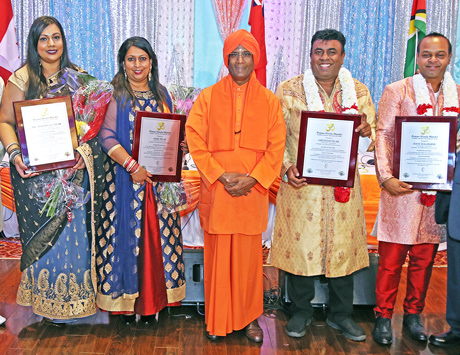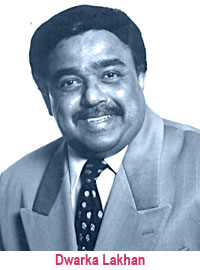Prachar Award

Toronto – Four persons from a prominent Guyanese family were the candidates for this year’s 18th Annual Pranav Dharm Prachar Award. The well attended, elegantly presented award ceremony took place on Saturday, September 16 at the Elite Banquet Hall.
The awardees – Sham Tilak and sister Dr Sharmila Tilak along with Dave Raghubir and wife Asha Tilak (another of the Tilak siblings) – were recognized and honoured for their commitment and support for altruistic work they are carrying out in their former homeland, Guyana.
This family’s altruism came to the fore in 2010 when Sham visited Guyana and was struck by the lack of educational opportunities, particularly in computer literacy, in his home village of Cotton Tree, West Coast, Berbice.
He formed a charitable organization - Save Abee Foundation - and along with his sister Asha, converted their family home in the village into a school where computer technology is taught alongside other academic subjects.
Sham is the Founder/President of the Foundation while Asha and David Raghubir are President and Vice President respectively, of its Canadian Chapter.
The Foundation is based out of Guyana and also has a US Chapter.
On its website, the Foundation’s mission statement is: “to help develop the youths into better persons arming them with skills needed in Social Science and personal development while at the same time performing service to Humanity.”
The evening’s program commenced with the Canadian National Anthem, followed by a Hindu Universal Prayer and the Sarasvati Vandana, all done by students of the Pranav Ashram’s Heritage and Music class. The students also rendered some of the latest Bollywood hit songs accompanied on the keyboard by maestro Harold Boodoo, on the drums by Devindra Ramoutar and on the tablas by Pranav music students.
The event was attended by several prominent professionals and business persons from the community in addition to the Ashram’s devotees and well wishers.

By Dwarka Lakhan
They are supposed to “serve and protect” but the ability of Guyana’s Police Force (GPF) to adhere to its motto is compromised by conflict among its top brass, a lack of professionalism, political interference, and a myriad of accusations of criminal activity.
So much so that a 2016 USAID Report on Guyana stated that the GPF is the least trusted institution in the country, highlighting the underpinnings of unabated criminal activity and the continued failure of the police to make a significant impact on reducing crime.
Although it would be inappropriate to paint all members of the GPF with the same brush, the overall perception of its untrustworthiness has tarnished its image among the population at large.
Earlier this month, President David Granger put a dent in the GPF’s image by saying that work has to be done to ensure that the law enforcement agency is more professional and efficient in the execution of its duties and responsibilities. He said that there is a serious lack of professionalism at the high levels of the Guyana Police Force, raising grave cause for concern.
He was at the time commenting on the findings of the Commission of Inquiry (COI) into the alleged assassination plot against him, which he claimed exposed serious deficiencies and weaknesses in the GPF that must be corrected. The COI report, which was prepared by a British security expert, who is an Advisor to President Granger as part of the United Kingdom’s Security Sector Reform (SSR) Programme, has not yet been made public.
Ironically, rumors circulating in the country indicate that the purported assassination plot is merely a deliberate political distraction with no merit. The Head of the Criminal Investigations Department of the GPF evidently told the COI that allegations about the plot were inherently not credible. He also noted that the plot, which involved the accused paying the informant some GYD$6 - $7 million to kill the President was reported in March 2017, while the plan was formulated in March 2015, that is, close to two years prior. Adding doubt to the plot is the position of the GPF’s Legal Adviser who contended that the evidence provided was very weak to recommend a charge of incitement to commit murder.
What was highlighted during the investigation into the assassination plot is the apparent unsatisfactory professional relationship between the GPF’s substantive Commissioner of Police and its Assistant Commissioner of Police (Administration) – probably leading to the President’s allegation of a lack of professionalism.
Barring the President’s contention about the GPF, negative perceptions of the police have also been perpetuated by a wide range of accusations, allegations and insinuations of police brutality, involvement in criminal activities, sexual assault, drug trafficking, ineffective crime fighting strategies, extra-judicial killings, theft, neglect of duty, unlawful exercise of authority, disobeying lawful orders, misplacements of court jackets, high rates of unsuccessful prosecutions in courts, bribery, and the illegal demand for money from residents, colloquially referred to as ‘top-ups,’
In a more recent incident, allegations were made against the police for its involvement in the discovery of a mysterious Brazilian plane, registered to the Brazilian bank Banco Bradesco, on an illegal airstrip last month.
Minister of State Joseph Harmon confirmed that the allegations are being investigated, saying: “There is some information that is available to us which is suggesting a certain level of collusion and that information we take very seriously and it will inform the way in which we deal with the actual deployment of ranks in these areas.”
A local newspaper cited well-placed sources who claim that the police might have been paid as much as GYD$10 million by individuals who fled the plane.
This is not the first instance of illegal planes being discovered in one of several illegal airstrips in Guyana – giving cause for concern among government officials.
In defending the integrity of the police last November, Public Security Minister, Khemraj Ramjattan contended that “People are reporting more crimes now than before because they feel a renewed confidence in the Police Force.” The Minister was disputing claims that there was an increase in crime and that the government was manufacturing crime statistics.
Yet, in the same breath, Ramjattan urged more citizens to speak out against rogue cops, stating: “Massive amounts of drugs, cocaine, meth, and cannabis sativa have this appealing effect on even law enforcement officers getting corrupt.”
Referring to a murder accused allegedly bribing police officers, the Minister further indicted the GPF, saying: “We are going to do everything to scrutinise some of the investigators and investigations,”, adding that, “unless we cleanse the Police Force and law enforcement, once we start cleaning up there, I think we are going to have a better security system.” Arguably, he is aware of corruption within the GPF.
Further highlighting problems in the GPF, the then acting Police Commissioner in September 2016 is reported threatening to expel traffic and anti-crime patrol members from the force who solicit money from the public or stop civilians even if no offence has been committed. He then noted that 28 members of the police force have been dismissed for various offences.
The acting Police Commissioner also referred to several incidents of criminal behavior, including policemen who were implicated in the theft of several cellular phones from the Guyana Telephone and Telegraph Company while probing a break and enter and larceny; a policeman who was on “fixed point” duty near the Georgetown Prison who shot and killed an unarmed misbehaving man with a high-powered weapon; trainees who stole their colleagues’ cellular phones at the police training school; one constable who chopped another with a cutlass that he should not have had in his possession in the first place; positive drug tests in policemen; the fleecing of miners of raw gold; causing death by dangerous driving; and discharging rounds at an unarmed suspect during a scuffle.
He castigated the police for behaving “like bandits” resulting in an antagonistic relationship between the law enforcement agency and communities. And in a personal attack, he expressed grave concern about members of the Guyana Police Force fleecing civilians of money to satisfy their lifestyle, which included multiple relationships, partying five times per month, having expensive cellular phones and throwing box- hands. He also accused supervisors of acting in collusion with junior officers to enrich themselves.
Further undermining the GPF, the government has been accused of interference in its operations. In July, the government appointed Police Service Commission (PSC) recommended that a number of disciplinary matters be dismissed.
Evidently, the PSC has no constitutional authority to instruct the force not to charge nor discipline. What the PSC has is constitutional authority to review disciplinary action based on appeal. Acting otherwise is usurping the authority of the force. The decision to charge or not to charge police is vested in the Director of Public Prosecutions.
Effectively, acting outside of its constitutional ambit, puts the PSC above the law, and threatens the people’s safety and the nation’s security.
And in another incident of interference, President Granger advised the PSC that it should put on hold planned promotions that had been recommended by the GPF. His actions sparked concerns about the constitutionality of his request since Guyana’s Constitution prohibits anyone from instructing the Commission how to carry out its duties – leading to a challenge in the High Court.
In defending his position, Granger said that he put the promotions on hold because there have been many legitimate complaints by members of PSC and aggrieved police officers of abuse and malpractice in the GPF. He said it was not his intention to impede the work of the PSC but decided to put the promotions on hold until investigations into the complaints were completed.
Minister of State, Mr. Joseph Harmon further implicated the police in a letter informing the PSC of the President’s request to hold the promotion of officers of the Force to allow for further scrutiny of the proposed list of ranks.
He stated: “We are not trying to trample on the constitutional rights of the Commission but damage can be done if persons, who are not fit and proper, make decisions, which are injurious to public security. We want the constitutional Commission to function efficiently but at the same time we want to make sure that the public can depend on the decisions that come out of that Commission being in the best interest of the nation.” Evidently, the government does not trust certain officers in the GPF.
At the time of writing, a new Police Service Commission is about to be appointed. Some sources indicate that there will be a shake-up at the top. Time will tell whether such shake up will have political implications or will enable the GPF to retain its credibility. For now, it has none.


